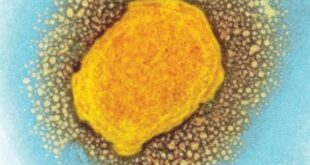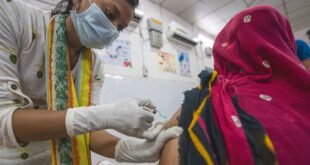- Minoxidil in topical form was approved in the 1980s by the FDA for treating hair loss.
- Although the tablet format is not approved to treat this, more dermatologists are prescribing it ‘off-label’.
- The pills are a much cheaper option for patients to use regularly.
- More research into the use of minoxidil tablets for hair regrowth is required.
For years, doctors and dermatologists have relied on lotions, drugs, and cosmetic procedures to help treat hair loss — leading to some patients facing sizable bills.
But perhaps not for much longer. One type of medication is fast rising in popularity thanks to its beneficial (albeit unintentional) effects on hair regrowth.
Minoxidil’s role in hair growth came as somewhat of a happy accident.
“Shortly after minoxidil was approved for the treatment of hypertension [in the 1970s], there were reports of patients growing excess hair while on the medication,” Dr. Brittany Craiglow, associate adjunct professor in the Dermatology Department of the Yale School of Medicine, told Healthline.
“Harnessing that side effect, topical minoxidil was eventually developed and FDA approved in 1988,” she continued. Millions of people have since used this in products such as Rogaine and Propecia. However, the use of minoxidil in pill format is becoming far more commonplace. But why?
“There is a fairly substantial body of literature now supporting the use of low dose oral minoxidil for hair loss,” stated Craiglow.
For example, one studyTrusted Source had 30 men with androgenic alopecia (aka pattern baldness) take minoxidil pills. All saw an improvement in hair regrowth, with 43% noting it as ‘excellent’. However, that study did not have a control group.
Meanwhile, in a study of over 50 participants, minoxidil tablets also effectively treated female pattern hair loss.
Yet the drug’s influence extends beyond pattern baldness. Studies indicate taking minoxidil orally can aid in reducing hair loss resulting from telogen effluviumTrusted Source (a more temporary form of loss and thinning) and cancer therapies.
In addition to cosmetic gains, a further appeal lies in the low dosage and price point of these pills.
“I start my patients on 0.625mg (a quarter of a tablet) and then increase by another quarter — usually maxing out at 1.25mg. For males, I will go as high as 2.5mg,” Dr. Geeta Yadav, board-certified dermatologist and founder of FACET Dermatology, explained to Healthline.
“You’ll need a prescription to get it,” she continued, “but the generic form of minoxidil is usually quite affordable, at around $3 or so for 30 pills.”
Oral vs topical minoxidil
If minoxidil has been used topically for several decades, why the push towards tablets?
While plenty of studies have highlighted the positive effects of topical application, some research has noted the drug is similarly effective when taken orally
According to cosmetic dermatologist Dr. Michele Green, other factors are also at play.
“The use of oral minoxidil is appealing to some patients who find more consistency in taking the pill once daily, instead of topical application of minoxidil twice daily,” she told Healthline.
There’s also less mess involved and a reduced risk of side effects associated with topical application, which include “headaches, itchy scalp, greasy hair, redness, and irritation.”
Applying minoxidil topically also requires “more frequent hair washes…due to the effects on the appearance of one’s hair,” noted Green. “It also makes the hair dry and susceptible to breakage.”
Last but not least, the cost of minoxidil-based lotions is typically much higher than the tablets.
Minoxidil lowers blood pressure by influencing blood vessels, and it is this effect that also encourages hair growth.
“Minoxidil is an anti-hypertensive medication,” explained Dr Rae Lynne Kinler, a hair transplant surgeon at Ziering Medical.
“It works by relaxing the blood vessels so blood can flow easily through,” she continued, and “with blood comes nutrients, [which] stimulate hair growth.”
In topical form, minoxidil is approved by the FDA for treating hair loss. The tablet form, however, has not yet secured approval.
As such, minoxidil pills are currently prescribed ‘off-labelTrusted Source’ for hair loss. This is when a drug is given to treat a concern different from the condition for which it is approved.
Yet, “this doesn’t mean that oral minoxidil is unsafe,” stated Craiglow. “It just means it hasn’t been specifically studied in clinical trials for the treatment of androgenetic alopecia, whereas topical minoxidil has.”
“When taken in low doses of 0.25mg to 5mg, it is considered safe,” Green added.
Like most drugs, minoxidil pills can cause some side effects. Kinler also noted that compared to topical minoxidil, the side effects from pills might take longer to disappear.
According to Yadav, the tablet’s side effects include:
- Racing heartbeat
- Headache
- Lightheadedness
- Fluid retention
- Light hair shedding (when you begin taking it)
- Excess body hair growth
At higher doses, Green shared, you may experience symptoms such as:
- Postural hypotension (a sudden drop in blood pressure due to movement)
- Tachycardia (elevated heart rate)
- Angina (inadequate blood flow to the heart)
Minoxidil pills also come with a black box warning from the FDA, highlighting their potential impact on heart health.
As such, it’s vital to get a personalized diagnosis from your doctor or board-certified dermatologist before taking minoxidil pills, said Yadav, to ensure they are safe for you. “Your medical history may preclude you [from] taking it,” she explained.
Age can also be a factor in their suitability, said Kinler. “I strongly recommend against [them] in older patients due to potential renal issues.”
However, Yadav did note that “for hair loss, the dosing is lower — so the side effect profile is less when the medication is taken [to treat this].”
As with any drugs, “patients should notify their doctor immediately at the onset of any side effects,” stated Green.
Hair loss occurs in a variety of forms and impacts a vast number of people. By 2024, almost 13 million Americans are expected to use hair regrowth products.
Previously, treatments for hair restoration centered around pricier lotions and drugs, injections, and procedures. Minoxidil pills may offer an effective treatment solution at a much lower cost — but more research is required.
“The use of oral minoxidil is increasing in popularity,” asserted Green. “As more studies show its efficacy, I believe it will get FDA approval for treating hair loss.”
 Pakish News We are an interactive media group that here a purpose to update users with the latest information. Our mission is to give you knowledge not only about your surroundings. We will also update you around the Globe.
Pakish News We are an interactive media group that here a purpose to update users with the latest information. Our mission is to give you knowledge not only about your surroundings. We will also update you around the Globe.



